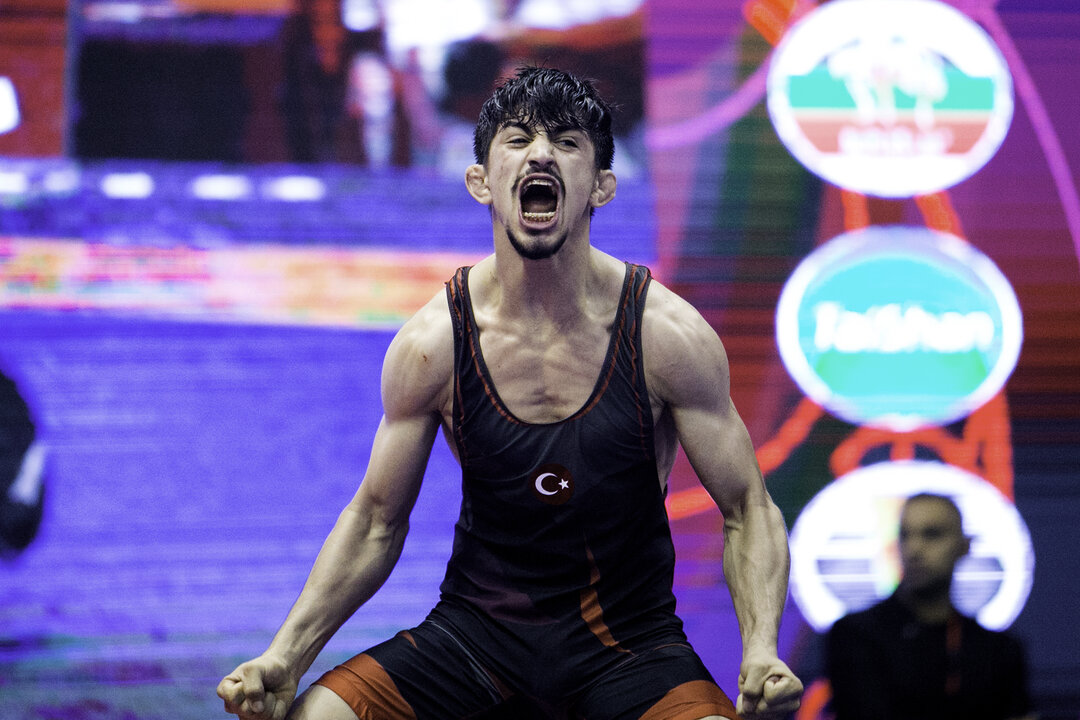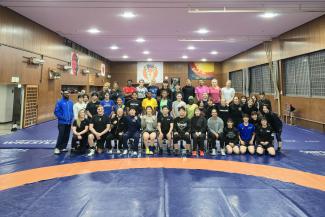Trio of Russians Make Day Three Finals
Tuesday, March 5, 2019 - 20:06 By Eric Olanowski

NOVI SAD, Serbia (March 5) – Russia, who trails Georgia by 38 points heading into the third day of wrestling, won all three of their semifinal matches on Tuesday night and inserted their fourth Greco-Roman wrestler into the U23 European finals.
Alen MIRZOIAN (RUS), Magomed YARBILOV (RUS), and Vaag MARGARIAN (RUS) are the trio of Russians who locked up their spot in the Day 3 finals. The trio will have an opportunity on Wednesday night to match their teammate Islam OPIEV's Day 2 gold-medal performance.
Defending U23 European champion Alen Mirzoian defeated 2017 U23 European bronze medalist Artur POLITAIEV (UKR), 9-4, in the semifinals and will meet Serbia’s Sebastian NAD for the 67kg title.
At 72kg, Magomed Yarbilov became Russia’s second Day 3 finalist after he won the battle between past junior world bronze medalists and beat Islambek DADOV (AZE), 3-0, in the semifinals.
Yarbilov will wrestle Georgia’s returning U23 European champion Ramaz ZOIDZE in the 72kg gold-medal bout.
In his opening round matchup, Zoidze exacted revenge on Cengiz ARSLAN (TUR), the man who stole the U23 world title from him a season ago. Zoidze also defeated Hrant KALACHYAN (ARM) and Norway’s Juan AAK on his way to a second consecutive U23 European final.
Russia's third Day 3 finalist is defending U23 European champion Vaag Margarian. Margarian defeated Turkey’s Hasan YILDIRIM (TUR) in the 82kg semifinals and set up a finals date with Hungary’s Zotlan LEVAI.
 Returning champion Kerem KAMAL (TUR) will wrestle for his second consecutive U23 European title (Photo: Gabor Martin)
Returning champion Kerem KAMAL (TUR) will wrestle for his second consecutive U23 European title (Photo: Gabor Martin)
The pair of Day 3 gold-medal matches that won’t feature a Russian wrestler will take place at 60kg and 97kg.
At 60kg, Turkey’s defending U23 European champion Kerem KAMAL (TUR) scored the impressive 9-0 win over Georgia’s Irakli DZIMISTARISHVILI. Kamal will meet Romania’s Razvan ARNAUT (ROU) in the 60kg gold-medal match.
At 97kg, Finland’s 2018 junior world champion and U23 European bronze medalist Arvi SAVOLAINEN scord the 4-0 shutout win over Turkey’s Ibrahim TIGCI in the semifinals and will take on Giorgi MELIA (GEO) in tomorrow’s gold-medal bout.
The Day 3 finals begin on Wednesday at 18:00 (local time).
Results
60kg
GOLD - Razvan ARNAUT (ROU) vs. Kerem KAMAL (TUR)
SEMIFINAL - Razvan ARNAUT (ROU) df. Zhora ABOVIAN (UKR), 2-0
SEMIFINAL - Kerem KAMAL (TUR) df. Irakli DZIMISTARISHVILI (GEO), 9-0
67kg
GOLD - Sebastian NAD (SRB) vs. Alen MIRZOIAN (RUS)
SEMIFINAL - Sebastian NAD (SRB) df. Alexandru SOLOMON (ROU),6-1
SEMIFINAL - Alen MIRZOIAN (RUS) df. Artur POLITAIEV (UKR), 9-4
72kg
GOLD - Ramaz ZOIDZE (GEO) vs. Magomed YARBILOV (RUS)
SEMIFINAL - Ramaz ZOIDZE (GEO) df. Juan AAK (NOR), 12-4
SEMIFINAL - Magomed YARBILOV (RUS) df. Islambek DADOV (AZE), 3-0
82kg
GOLD - Zotlan LEVAI (HUN) vs. Vaag MARGARIAN (RUS)
SEMIFINAL - Vaag MARGARIAN (RUS) df. Hasan YILDIRIM (TUR), 3-1
SEMIFINAL - Zotlan LEVAI (HUN) df. Stanislau SHAFARENKA (BLR), 8-0
97kg
GOLD - Arvi SAVOLAINEN (FIN) vs. Giorgi MELIA (GEO)
SEMIFINAL - Arvi SAVOLAINEN (FIN) df. Ibrahim TIGCI (TUR), 4-0|
SEMIFINAL - Giorgi MELIA (GEO) df. Arif NIFTULLAYEV (AZE), 7-4




Share your thoughts.
Comments